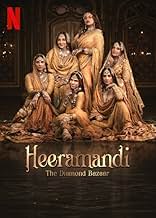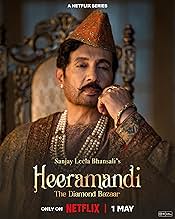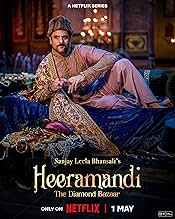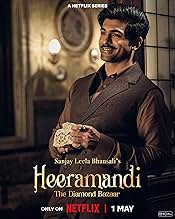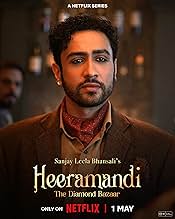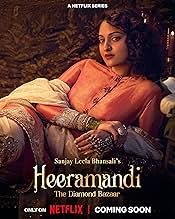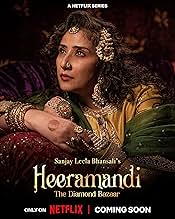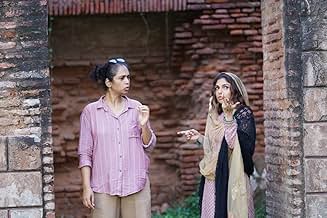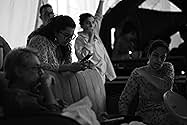Sanjay Leela Bhansali brings his majestic signature flair to stories of love and betrayal in the lives of courtesans in pre-independence India.Sanjay Leela Bhansali brings his majestic signature flair to stories of love and betrayal in the lives of courtesans in pre-independence India.Sanjay Leela Bhansali brings his majestic signature flair to stories of love and betrayal in the lives of courtesans in pre-independence India.
- Awards
- 29 wins & 42 nominations total
Browse episodes
Summary
Reviewers say 'Heeramandi: The Diamond Bazaar' is visually stunning with lavish sets and costumes, exploring themes of love, betrayal, and ambition. Manisha Koirala, Sonakshi Sinha, and Aditi Rao Hydari deliver nuanced performances. However, criticisms include uneven pacing, weak storytelling, and underdeveloped characters. Some find the plot lacking emotional depth and coherence, with debated historical accuracy. Despite its visual appeal, the series struggles with narrative execution and character development.
Featured reviews
Never expected this meandering story from this genius. None of the characters impresses. It's a strain watching pure dialogue delivery. Boring and lacklustre characters that fail to engage.
It seems the makers just wanted to somehow stretch a story to 8 episodes. The sets and costumes will impress only when you have well fleshed characters . Sorry Bhansali ji you have disappointed us.
Too much effort of audience goes in adjusting to names and recollection of past events because the scenes are forgotten due to lack of potency. I wonder why more effort was not put in. Basic principles of scene construction were ignored.
It seems the makers just wanted to somehow stretch a story to 8 episodes. The sets and costumes will impress only when you have well fleshed characters . Sorry Bhansali ji you have disappointed us.
Too much effort of audience goes in adjusting to names and recollection of past events because the scenes are forgotten due to lack of potency. I wonder why more effort was not put in. Basic principles of scene construction were ignored.
Powerful performance by Manisha, sonakshi. Interesting storyline..didn't enjoy the last 2 episodes as it was a complete diversion from the main plot. The politics of heeramandi is what makes the story enjoyable...Manisha and Sonakshi along with bibbojaan were really good, even saima and fattu are well written characters on the other hand richa was completely wasted Lajjo was a poor character no graph no depth. Actress who played Alamzeb her voice and diction were good but this role needed a very very good actress and she had limited expressions. Music is very good, it's a visually stunning film too.
If you are a sucker for visually pleasing set pieces, then this is a treat for your eyes. The set design will definitely be the benchmark for Indian cinema for days to come. Every scene looks like a painting. The costume design is immaculately seductive, feminine and elegant making everyone look so rich in taste.
First half of the show, with a lengthy narrative introduces us to its timeline and courtesan's life beyond the singing , dancing and beds. Themes like betrayal, envy, scheming,revenge, poltical subplots are slowly disclosed which gets you hooked as it builds up immense curiosity to find out how it all pans out. As it is set in the pre independence era, it also sheds light on freedom struggle amongst different strata of the society. The writing is just so clean and detailed. Highly appreciable.
But for some reason, the show makers decide to abandon all of these, all the great characters, the story building they themselves did so spectacularly. They just give up all of this to some lazy writing towards the end and devote the concluding moments in exploring "Patriotism" out of the blue. This immediately makes you unhinged from the screenplay, story and it sets in a strong sense of detachment towards the characters.
The show had everything going right for them since the beginning. The actors did a superb job. The art department blew it out of the park. The story had immense potential. But for some reason the writers were in a hurry to finish and didn't climax smoothly XD
Could've easily been a 9/10 but sadly doesn't hold up its side of the bargain.
First half of the show, with a lengthy narrative introduces us to its timeline and courtesan's life beyond the singing , dancing and beds. Themes like betrayal, envy, scheming,revenge, poltical subplots are slowly disclosed which gets you hooked as it builds up immense curiosity to find out how it all pans out. As it is set in the pre independence era, it also sheds light on freedom struggle amongst different strata of the society. The writing is just so clean and detailed. Highly appreciable.
But for some reason, the show makers decide to abandon all of these, all the great characters, the story building they themselves did so spectacularly. They just give up all of this to some lazy writing towards the end and devote the concluding moments in exploring "Patriotism" out of the blue. This immediately makes you unhinged from the screenplay, story and it sets in a strong sense of detachment towards the characters.
The show had everything going right for them since the beginning. The actors did a superb job. The art department blew it out of the park. The story had immense potential. But for some reason the writers were in a hurry to finish and didn't climax smoothly XD
Could've easily been a 9/10 but sadly doesn't hold up its side of the bargain.
The journey through the narrative landscape began with an air of anticipation and excitement, each episode unveiling layers of intrigue and promise. From the onset, the tale seemed poised to deliver a gripping saga of revenge and redemption, with Fareedan's quest for vengeance serving as the central driving force. As viewers, we were drawn into the intricate web of characters and conflicts, eagerly awaiting the resolution of the simmering tensions that lay at the heart of the plot.
However, as the story unfolded, cracks began to appear in the carefully constructed facade of the narrative. What started as a tale of personal vendetta soon morphed into something altogether unexpected and disconcerting. The introduction of Tajdar's love story initially seemed like a welcome addition, promising to add depth and dimension to the overarching narrative. Yet, as the plot progressed, it became increasingly apparent that this newfound subplot was not destined for a happy resolution.
Instead of serving as a complementary element to the main storyline, Tajdar's tragic romance became the focal point of the narrative, eclipsing the original premise of Fareedan's quest for justice. With each passing episode, the spotlight shifted further away from Fareedan's journey, leaving viewers wondering whether his pursuit of revenge had been relegated to the sidelines indefinitely.
What's more, the manner in which Tajdar's love story unfolded felt jarring and disjointed, lacking the organic flow and cohesion that characterized the earlier episodes. Scenes of tenderness and passion were abruptly interspersed with moments of heart-wrenching tragedy, leaving little room for the audience to fully invest in the emotional arc of the characters. Instead of feeling a sense of empathy or connection with Tajdar and his beloved, viewers were left feeling perplexed and emotionally disconnected, unsure of how to reconcile the sudden shift in tone and focus.
As if the abrupt departure from the original plotline wasn't disconcerting enough, the narrative took an even more bewildering turn in its final act. With only a handful of episodes remaining, the storyline inexplicably veered into the realm of patriotism, introducing themes and motifs that felt entirely out of place given the trajectory of the plot thus far. Suddenly, the central conflict shifted from the personal vendettas of individual characters to a broader, more abstract struggle for national identity and pride.
While patriotism can undoubtedly be a powerful storytelling device when wielded with skill and nuance, its sudden introduction in the eleventh hour felt forced and contrived, robbing the narrative of its authenticity and emotional resonance. What started as a tale of personal tragedy and triumph had devolved into a thinly veiled attempt at political commentary, leaving viewers feeling more bewildered than enlightened by the abrupt change in direction.
To make matters worse, the lack of a proper resolution only served to underscore the narrative disarray that had come to define the latter half of the series. Questions that had been meticulously seeded throughout the earlier episodes remained unanswered, dangling tantalizingly out of reach as the final credits rolled. What became of Fareedan and his quest for vengeance? Did Tajdar ever find peace after the untimely demise of his beloved? And what, if anything, did the sudden shift to patriotism ultimately achieve in terms of advancing the overarching themes and messages of the narrative?
As a viewer who had invested countless hours in following the twists and turns of the storyline, the lack of closure felt like a betrayal of trust. What had initially promised to be a gripping and emotionally resonant tale had devolved into a disjointed and unsatisfying mess, leaving me feeling disillusioned and disappointed by the narrative missteps that had come to define the latter half of the series.
However, as the story unfolded, cracks began to appear in the carefully constructed facade of the narrative. What started as a tale of personal vendetta soon morphed into something altogether unexpected and disconcerting. The introduction of Tajdar's love story initially seemed like a welcome addition, promising to add depth and dimension to the overarching narrative. Yet, as the plot progressed, it became increasingly apparent that this newfound subplot was not destined for a happy resolution.
Instead of serving as a complementary element to the main storyline, Tajdar's tragic romance became the focal point of the narrative, eclipsing the original premise of Fareedan's quest for justice. With each passing episode, the spotlight shifted further away from Fareedan's journey, leaving viewers wondering whether his pursuit of revenge had been relegated to the sidelines indefinitely.
What's more, the manner in which Tajdar's love story unfolded felt jarring and disjointed, lacking the organic flow and cohesion that characterized the earlier episodes. Scenes of tenderness and passion were abruptly interspersed with moments of heart-wrenching tragedy, leaving little room for the audience to fully invest in the emotional arc of the characters. Instead of feeling a sense of empathy or connection with Tajdar and his beloved, viewers were left feeling perplexed and emotionally disconnected, unsure of how to reconcile the sudden shift in tone and focus.
As if the abrupt departure from the original plotline wasn't disconcerting enough, the narrative took an even more bewildering turn in its final act. With only a handful of episodes remaining, the storyline inexplicably veered into the realm of patriotism, introducing themes and motifs that felt entirely out of place given the trajectory of the plot thus far. Suddenly, the central conflict shifted from the personal vendettas of individual characters to a broader, more abstract struggle for national identity and pride.
While patriotism can undoubtedly be a powerful storytelling device when wielded with skill and nuance, its sudden introduction in the eleventh hour felt forced and contrived, robbing the narrative of its authenticity and emotional resonance. What started as a tale of personal tragedy and triumph had devolved into a thinly veiled attempt at political commentary, leaving viewers feeling more bewildered than enlightened by the abrupt change in direction.
To make matters worse, the lack of a proper resolution only served to underscore the narrative disarray that had come to define the latter half of the series. Questions that had been meticulously seeded throughout the earlier episodes remained unanswered, dangling tantalizingly out of reach as the final credits rolled. What became of Fareedan and his quest for vengeance? Did Tajdar ever find peace after the untimely demise of his beloved? And what, if anything, did the sudden shift to patriotism ultimately achieve in terms of advancing the overarching themes and messages of the narrative?
As a viewer who had invested countless hours in following the twists and turns of the storyline, the lack of closure felt like a betrayal of trust. What had initially promised to be a gripping and emotionally resonant tale had devolved into a disjointed and unsatisfying mess, leaving me feeling disillusioned and disappointed by the narrative missteps that had come to define the latter half of the series.
After a long hiatus, I decided to give a new show a shot, but I was sorely disappointed. The show in question, "Heeramandi" by Sanjay Leela Bhansali, promised much but delivered little beyond its visual appeal. Known for his lavish sets and intricate costumes, Bhansali's skills in these areas were unmistakable and truly commendable. Unfortunately, that's where the positives ended for me.
Describing this show as "all style and no substance" feels almost too kind. It's a perfect example of a series that looks beautiful on the surface but lacks depth. The first episode was torturously slow, so much so that I found myself fast-forwarding through parts of it, which I rarely do if I'm trying to give a show a fair chance.
As the superficial allure of the stunning sets and costumes wore off, I tried to focus on the plot, only to find myself overwhelmed. The narrative introduced around 20 characters in what felt like a rapid-fire, haphazard fashion, moving forwards and backwards with little regard for coherence. It felt like a bad LSD trip, and even Confucius would forgive me for being utterly confused and confounded.
In essence, while Bhansali's "Heeramandi" might be a feast for the eyes, it's a famine for the mind. Despite its visual mastery, the series is shallow, lacking the compelling storytelling needed to make the aesthetic elements worthwhile.
Describing this show as "all style and no substance" feels almost too kind. It's a perfect example of a series that looks beautiful on the surface but lacks depth. The first episode was torturously slow, so much so that I found myself fast-forwarding through parts of it, which I rarely do if I'm trying to give a show a fair chance.
As the superficial allure of the stunning sets and costumes wore off, I tried to focus on the plot, only to find myself overwhelmed. The narrative introduced around 20 characters in what felt like a rapid-fire, haphazard fashion, moving forwards and backwards with little regard for coherence. It felt like a bad LSD trip, and even Confucius would forgive me for being utterly confused and confounded.
In essence, while Bhansali's "Heeramandi" might be a feast for the eyes, it's a famine for the mind. Despite its visual mastery, the series is shallow, lacking the compelling storytelling needed to make the aesthetic elements worthwhile.
Burning Questions With the Cast of Heeramandi
Burning Questions With the Cast of Heeramandi
Heeramandi: The Diamond Bazaar stars discuss their latest series on IMDb's Burning Questions. Sanjay Leela Bhansali's cast talks about their challenges and the most fun moments on set.
The Making of "Heeramandi: The Diamond Bazaar"
The Making of "Heeramandi: The Diamond Bazaar"
Here's an exclusive look at the creation of Heeramandi: A Diamond Bazaar. Join us as we go behind the scenes with none other than Sanjay Leela Bhansali himself!
Did you know
- TriviaDirector Sanjay Leela Bhansali offered veteran actress Mumtaz to be part of the series. Mumtaz declined the role citing disapproval of her husband owing to her age and the taxing demand of the character and the series.
- How many seasons does Heeramandi: The Diamond Bazaar have?Powered by Alexa
Details
- Release date
- Country of origin
- Official site
- Language
- Also known as
- Heeramandi
- Filming locations
- Production company
- See more company credits at IMDbPro
- Runtime1 hour
- Color
- Sound mix
- Aspect ratio
- 2.00 : 1
Contribute to this page
Suggest an edit or add missing content

Top Gap
What was the official certification given to Heeramandi: The Diamond Bazaar (2024) in Brazil?
Answer





